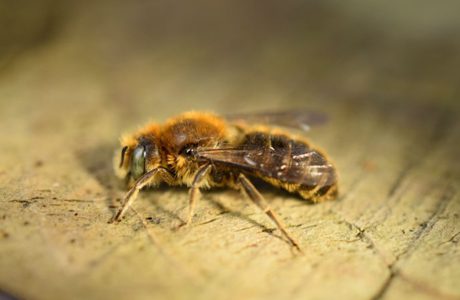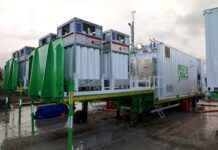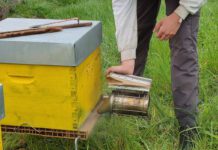
A bee species has been spotted for the first time breeding in Britain. The bee was found during a survey of Greenwich Peninsula Ecology Park in south east London.
First found in Britain by Natural History Museum scientist David Notton, the bee is using bee nest boxes provided at the Land Trust site, which is managed on a day-to-day basis by The Conservation Volunteers. The species, Hoplitis adunca, is more commonly found in continental Europe and does not pose a threat to other British pollinators.
Notton thinks it is unlikely to become widespread in Britain: “It’s at the limit of its temperature range here, and is restricted by its reliance on pollen from a specific plant called Viper’s Bugloss. But it’s a great example of how important urban green spaces are for giving pollinators a home and that putting bee nesting boxes in gardens and parks can help support pollinators too.”
The Ecology Park is a good habitat for the bee, with a warm micro-climate, a large quantity of its preferred flower, Viper’s Bugloss, and mud and dead wood to make nests from.
There are over 270 species of bee in Britain. Around 80 species can be found in Greenwich Peninsula Ecology Park in the former gasworks site on Greenwich Peninsula, with about 10% of these being at some degree of risk. Bee habitats on the site are managed by ranger Tony Day, with The Conservation Volunteers and the Land Trust working together to provide an ideal environment and help monitor populations.
The bee lives on its own rather than in a colony and makes its nest in hollow stems or holes in wood, capped with mud. Hole-nesting bees such as these sometimes get moved around when they nest in cavities in freight or vehicles. Given its living habits the discoverers have proposed a common name: Viper’s Bugloss Mason Bee.
Simon Pile, Estates Manager South at the Land Trust, said: “It’s fantastic that everyone’s hard work and our long-term investment in Greenwich Peninsula Ecology Park are having such a wonderful impact on the environment and this bee in particular. We’re delighted that it now calls Greenwich home and are looking forward to future research and discoveries at this little green oasis in London.”
According to Notton, the picture is mixed for bees in Britain: “Some bee species are doing ok, while others are struggling, with habitat change, climate change and pesticides all impacting the environment.”







